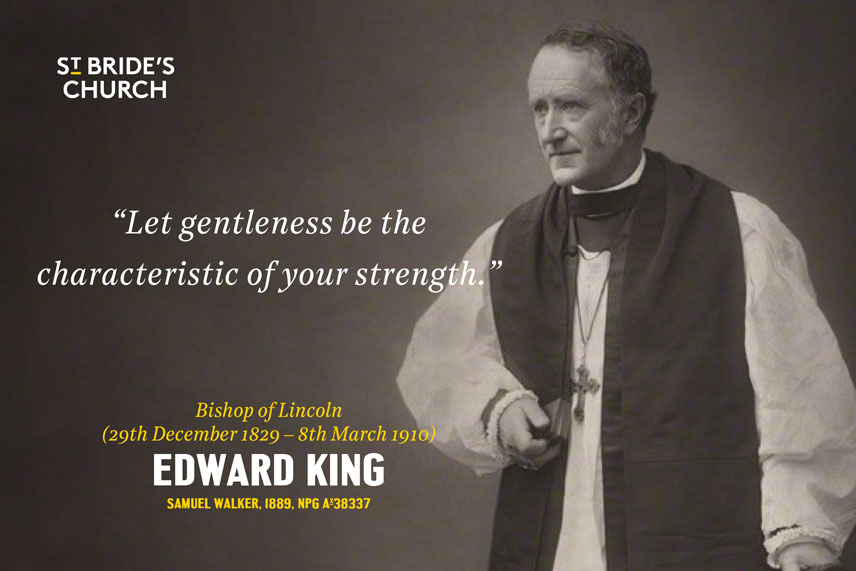Tomorrow, 8th March, is the day on which the Church of England commemorates a Victorian clergyman who is particularly close to my own heart, for reasons that I shall come on to explain. His name was Edward King. King was born in London in 1829, and had about as much clerical blood coursing through his veins as it was possible to have: his father was the Archdeacon of Rochester, and his grandfather the Bishop of Rochester.
After studying at Oxford, he was ordained in 1854, and he was then appointed chaplain and then Principal of Cuddesdon, the theological college where I myself trained for the ordained ministry about 130 years later. He was revered for his holiness of life and for his wise counsel, and he not only had a huge influence on the ordinands of his day, but strange though it may seem I myself was always very conscious of his legacy while I was training. It was if the building itself had soaked up something of his life of prayer. The college now has a wonderful new chapel, opened just a few years ago, that bears his name.
Edward King went on to spend a dozen years as a professor of theology in Oxford, before being consecrated Bishop of Lincoln in 1885, where he earned a reputation for being a profoundly prayerful, pastoral, and compassionate bishop to all in his charge, clergy and laity alike.
He was not uncontroversial, however, particularly for his advocacy of Catholic principles in ritual; indeed, he had to fight prosecution under the Public Worship Regulation Act of 1874. Just to give you an idea of the kind of shocking practices he was advocating – they included, the wearing of Eucharistic vestments, such as chasubles and stoles, the use of candles, using wafers, and mixing of water into the wine at Communion – all of which are practices that we do absolutely routinely here at St Bride’s every Sunday here during normal times without even thinking about it!
But for me it was a lasting sense of his wisdom, and his gentleness, and his prayerfulness that was to have a particular impact upon me – and for that reason, I would like to leave you with some words from the man himself. What I’m about to read to you is an extract from a sermon that he preached in 1893, on a text from Psalm 18: the phrase that he is preaching on is: ‘Thy gentleness hath made me great’. And I offer you these words, partly for the insight that they give us into the soul of this extraordinary man, but also for their inherent wisdom. So much of his message is still pertinent to the Church of today, and the people we seek to serve, as well as the context in which we strive to do it. But also, his words about the virtues of gentleness and patience are perhaps rather appropriate during this season of Lent. He wrote this.
With the resolve to stand firm and true in the defence of God’s truth, remember that the lesson of gentleness implies patience and long-suffering, and waiting for God’s good time and for one another. The progress (thank God) of the Church of England has been wonderful in the last fifty years. There is indeed much yet to be done, many prejudices to be put aside, much ignorance to be enlightened, much indifference to be awakened. But we need to remember the words of our text, ‘Thy gentleness hath made me great.’ God has waited patiently for us and brought us up to where we are. Let us try to do to others as God has done to us, and by gentleness to lead them on and make them great.
While there is life, there is hope: the penitent thief was accepted at the eleventh hour. The grace of God is as strong today as then. Even the end of a wasted life God will not reject if it be offered with a contrite heart, with true faith in the power of the Saviour’s blood.
Let all impatience, then, all harsh judgments of others, all self-seeking, be put aside, and all love of power and the desire to be first. Rather let us strive to take the lower place, ‘in honour preferring one another’. Then, when all is over, and we are set down at the Supper of the Lamb, and the bridegroom comes in to see the guests, and the great reversal of human judgments shall take place, and the first shall be last and the last first, may we hope to hear his voice saying to us: ‘Friend, come up higher.’
Meanwhile, ‘let patience have her perfect work’, and let gentleness be the characteristic of your strength.
Amen.



